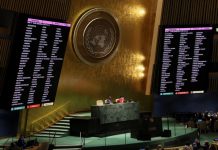India signing a new military agreement with the United States for the sharing of sensitive satellite data has upped the ante in Asia; entrenching both the India-China conflict, and US-India military co-operation for years to come.
The Basic Exchange and Cooperation Agreement (BECA) on Geospatial Cooperation would provide India with access to topographical, nautical and aeronautical data vital for the firing of long-range missiles and armed drones. It would also allow the US to cooperate with India by providing advanced navigational aids and avionics on US-supplied aircraft.
US Secretary of State Mike Pompeo and Defense Secretary Mark Esper arrived in New Delhi on Monday for an annual strategic dialogue at a time when clashes between Indian and Chinese forces at the disputed Himalayan border has heightened tensions.
The anti-China, and anti-Pakistan rhetoric by extension, was on the surface during the joint meetings.
“I am glad to say the United States and India are taking steps for cooperation against all manners of threats and not just those posed by the Chinese Communist Party,” Pompeo said after meeting with Indian Foreign Minister Subrahmanyam Jaishankar and Defence Minister Rajnath Singh.
Putting emphasis on the origin of COVID-19 Pompeo said: “The challenges that came from the pandemic that originated in Wuhan also led to robust discussions about the Chinese Communist Party [CCP].”
“Our focus now must be on institutionalising and regularising our cooperation to meet the challenges of the day and uphold the principles of a free and open Indo-Pacific well into the future,” Esper said on Monday.
More than the sharing of satellite data, the deal opens the potential for vast US military sales to India in the future. Since the US started preparing India as a counter-weight against China in Asia, it has been attempting to wean India away from Russian-made military hardware.
Under direction of the US State Department, Lockeed Martin has offered to sell India upgraded F-16s under a new variant known as the F-21 to fulfill India’s medium multi-role fighter needs, and has also offered the heavyweight F-18 more recently. The US has also discouraged Indian purchase of the Russian S-400 missile defense batteries, and offered its own Patriot missile systems as an alternative.
Cognizant of the danger posed by accelerated Indian militarisation, Pakistan’s Ministry of Foreign Affairs released a statement condemning BECA as the advent of a new arms race in the region. The Spokesperson for the Ministry said the following:
“Pakistan has taken note of the signing of the Basic Exchange and Cooperation Agreement (BECA).
Pakistan has been consistently highlighting the threats posed to strategic stability in South Asia as a result of provision of advanced military hardware, technologies and knowledge to India. India’s massive acquisition of armaments and expansion of its nuclear forces, including introduction of new destabilizing weapon systems, are developments with serious repercussions for peace and stability in South Asia.
The recent unprecedented rate of missile tests conducted by India is yet another manifestation of dangerous Indian conventional and nuclear military build-ups. It again corroborates concerns expressed by several international experts on the military spin-offs of conducting high technology trade with India, which has not only eroded the international norms but has also resulted in negatively affecting the strategic stability in South Asia. These developments clearly negate the argument that India’s mainstreaming in the international export control regimes will further the non-proliferation objectives of these regimes.”
China too has objected to Pompeo’s actions.
“We urge Pompeo to abandon his Cold War mentality, zero-sum mindset, and stop harping on the ‘China threat’,” Chinese foreign ministry spokesman Wang Wenbin told a news briefing in Beijing.
The entrenchment of geo-political fault lines in Asia due to India’s increasingly hostile stance towards China and Pakistan is also having knock-on effects.
Russian President Vladimir Putin announced on October 22nd that while there was no immediate need for a Sino-Russian military alliance, there was a possibility that such an alliance could be forged in future. The President’s statement came at a time when both Moscow and Beijing perceive growing threats to both nations from a more adventurous US.









